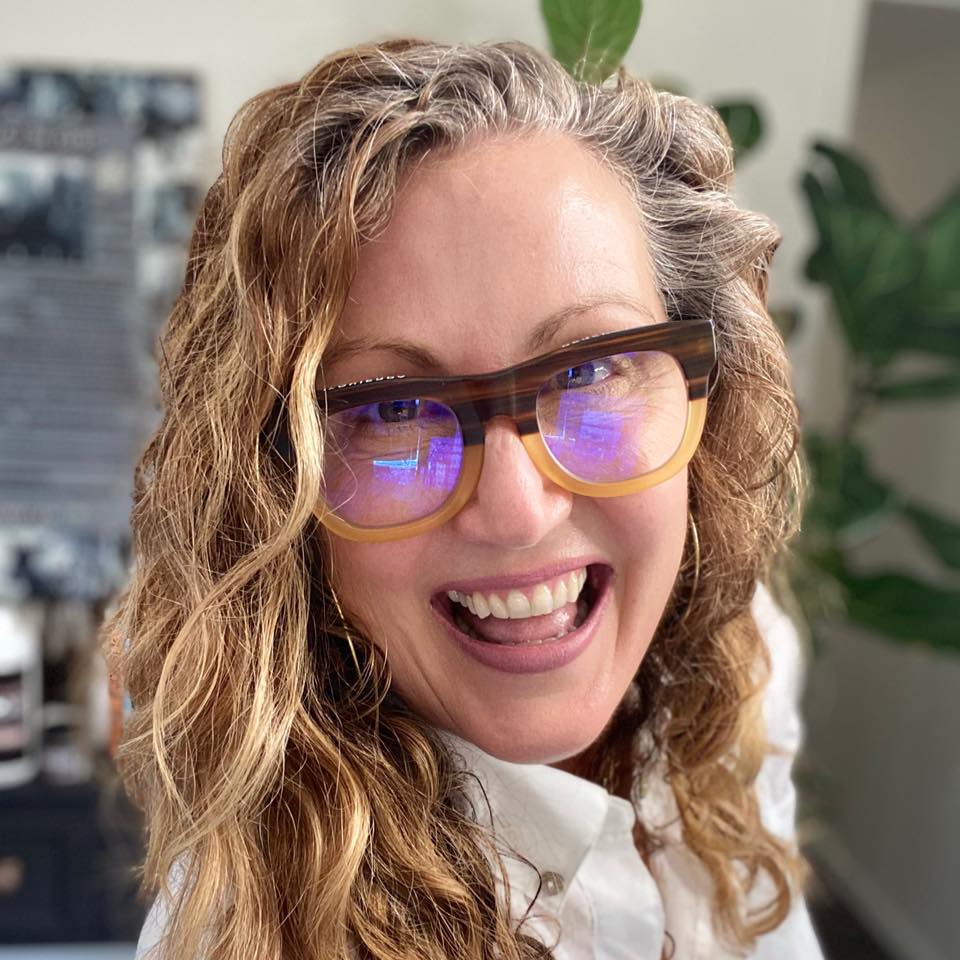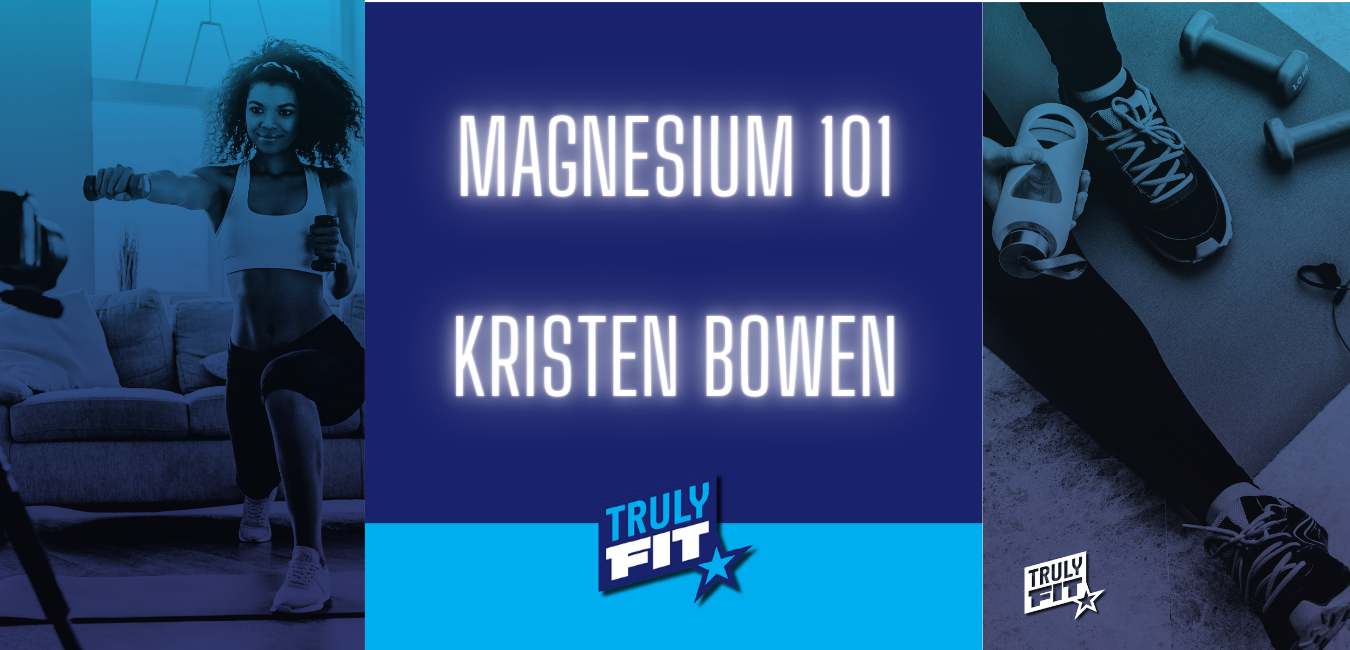
Magnesium 101 – Kristen Bowen

Guest: Kristen Bowen
Release Date: 11/8/2021
Welcome to Trulyfit the online fitness marketplace connecting pros and clients through unique fitness business software.
Steve Washuta: Welcome to the Trulyfit podcast, I am your host, Steve Washuta, co-founder of Trulyfit and author of the book Fitness Business 101. In today’s episode, we discuss magnesium, I have Kristen Bowen on who is a magnesium health advocate and the founder of living the good life naturally to help me break down what exactly magnesium does in the body, the different forms of magnesium available for intake, the forms that might be better for higher absorption and efficacy.
The synergistic effects if any, that other vitamins and micronutrients can play when taking with magnesium, interesting studies behind magnesium problems that can be associated with magnesium deficiencies, different brands of magnesium that she recommends foods that we get magnesium from, and a host of other things concerning magnesium. It was a very eye-opening conversation for me and what I was looking forward to for a while.
So I’m really glad to share this information with everyone. With no further ado, here’s Kristen, and Kristen, thank you so much for joining the Trulyfit podcast, why don’t you give the listeners in the audience, a background and a bio on what it is that you do around the Health and Fitness and Lifestyle industry.
Kristen Bowen: My focus is helping people understand the importance of cell saturation with magnesium. It’s time to upgrade or magnesium. So I like when I’m sitting next to someone on an airplane. They say what do you do? And my simple answer is I am magnesium.
Steve Washuta: I love it. So let’s delve right in here. Give us a brief definition of what magnesium is and what it doesn’t the body.
Kristen Bowen: It’s the master mineral, it starts everything you can have so many incredible things going into your body exercising the right food. If you do not have enough magnesium, you do not have the sparkplug to make all those connections to all of the good things that you’re doing. And aural synthetic magnesium is not enough. It is time to upgrade our magnesium levels.
Steve Washuta: Now, I’m assuming you’re saying that because most people take their magnesium orally, can you describe other forms in which you can get magnesium intake?
Kristen Bowen: Right, so it’s so easy to take that powdered pill that’s been heated pulverized so that it can go down a conveyor belt. But it’s not the way to get cell saturation. And when we’re at cell saturation, that’s when magnesium can kick in and start over 1000 different processes in your body.
Now ideally, we’re getting it from food, but we’re not living ideally anymore. And because of the overuse of synthetic fertilizer, red pepper used to be loaded with magnesium. Now, even the organic section doesn’t even have trace amounts of magnesium. So we’re on plan B and ultimate magnesium is found through soaking in magnesium.
Steve Washuta: Okay, so before we get there, I want to hinge on something that you just mentioned. Magnesium in foods, can you name some of those foods that magnesium is supposed to be in or where we could get adequate magnesium if we had enough of these?
Kristen Bowen: Yes, absolutely. Leafy green vegetables, there are nuts. I love cRIO Bru, that’s one of the richest sources of magnesium currently available in our foods. And we need to be obviously eating those great food choices. But it’s not enough to offset the higher magnesium burn rate that most of us currently experience.
Steve Washuta: So you talked about, you know, different avenues for sort of higher absorption and efficacy taking it. You know, not necessarily orally but are there also things you can pair it with. I know a lot of times there are different vitamins that if you pair together synergistically they have more effects this magnesium has a like a duo that it should be paired with
Kristen Bowen: vitamin D. So sunshine, I am not a fan of synthetic nutrition. If synthetic nutrition worked, we could go to the cold cereal box with all of the synthetic nutrition in there and get what our body needs. We all know common sense that’s not working. Then is what we do is we go to the health food store and we’re purchasing those same synthetic nutrients, hoping that it increases our health.
Is what we need to do is make sure that we’re starting at the beginning In the beginning is sunshine and magnesium. So many people will know, oh, my vitamin D is low, my vitamin D is low, but I’m in the sunshine all of the time. That’s because you didn’t have enough magnesium that helps your body convert your stored vitamin B into active vitamin D. And currently right now, when you and I are recording this podcast, we’re coming to the end of 2021.
And I think now, more than ever, people are understanding the benefits and the need that vitamin D is critical in maintaining a healthy immune system. But we need to go to the beginning, you don’t get low in vitamin D unless you were already low in magnesium. So let’s stop punching holes and chasing symptoms. And let’s start at the beginning and build that strong foundation.
Steve Washuta: What are some of the problems and I’ll sort of be more specific here. If I’m an average general population person, what are some of the problems that I would see day to day if I had magnesium deficiencies?
Kristen Bowen: This will vary a little bit for each person but things that will show up are skin problems, low energy, a low immune system, asthma, constipation, autoimmune issues, migraines, muscle cramping, brain fog. Those are a few of the things that will happen when your magnesium is low. Oh, gut issues digestion issues uptake of nutrients.
Steve Washuta: Can you test your magnesium levels? Can you go to a lab and say I have this amount of magnesium in my body at any given time? Are those tests not accurate?
Kristen Bowen: I am so glad you brought this up. Let’s go here. So there are numerous ways to test your magnesium. Please understand where I’m coming from, I want minimum input. For maximum output of everything I do, I do not want to be one of those people that spend 23 and a half hours a day focused on helping to create help.
I am creating health in my body to live a great big, glorious connected life with people that I love. That’s why I want help. And so I want the best, most effective testing. So Western medicine has a serum of blood serum test. And magnesium is so important to your body. That your body will pull from your pancreas from your heart from your digestion. To ensure that your blood serum stays at 1%. So we can have every major area in your body lacking magnesium.
But because of the importance to keep you alive, your blood serum looks great. That’s not a good fit. For me. There’s also a new way to test that came out. I was so excited about this because I thought this will be so much simpler for people. I liked things easily. And it was very similar to how you would test for ketones. A urine strip that you would put in your urine stream and it will give you your magnesium feedback number. It’s not accurate at all, I had about 30 test strips. I didn’t even put it out to group testing because I could test at noon.
Then I could test at 1230 and one would say low and one would say hi. So hopefully the technology on that will improve. And we can switch over to that for ease. But at this point, it’s not accurate data. The next way is a magnesium red blood cells test. That magnesium red blood cell test is showing how much magnesium is around every cell in your body. And that’s the one that I want access to. And it’s so simple.
You can go online, I prefer walking labs, I’m not affiliated with them in any way. I just have used them for 20 years and have found them to be very reliable. So walk in labs.com you get on you pay for your test online. And then you go to the lab that’s closest to you have your blood work drawn. And then within 24 to 48 hours. They will upload your magnesium number where your red blood cell number is now.
Years ago I’ve been talking magnesium now for 20 years. And helping people achieve cell saturation. years ago, they dropped the number to five. And their reasoning was not just walking labs just across the board, anyone who tested dropped the standard. So I still want my magnesium red blood cell tests between 6.3 and 7.2. When you hit between those numbers, you are at cell saturation.
Steve Washuta: So you might not know the answer to this question and feel free to say you’re not sure. But why is it that they use the serum as the standard number. Rather than this red blood cell test as a financial issue?
Kristen Bowen: In my opinion, it’s because it takes so long to trickle down new information. Every once in a while. Western medicine will have the ability, the understanding, and the knowledge to test the red blood cell. But it takes so long for new information to trickle down.
And usually, when that new information comes out. It takes 20 to 35 years for it to actually start showing up in practices. And so it’s just the system as it is set up. The updating on things like that. That do not have a ton of money to be made is very slow and changing.
Steve Washuta: Let’s go ahead and say I don’t have access to this test. Or I’d rather not get this test. But I’ve been taking magnesium for 60 days. And in the forums in which you suggest is there a way. In which I can sort of anecdotally feel that this magnesium may be working? Should I be looking for particular signs?
Kristen Bowen: Oh, absolutely, there is. And one thing I want to filter this comment through is, we’re all a little bit different. Our cells need some of the same things. Your mitochondria, my mitochondria need magnesium. For 56 different actions at the mitochondrial level. But my vagus nerve, the tone. And quality of my vagus nerve is probably a little bit different than your vagus nerve.
And so as I’m talking about this, please understand. If you’re not experiencing the things that I’m talking about from magnesium. Vagus nerve tone, always comes into play. And so if you don’t fall exactly in line with what I’m saying, Remember, it’s that individuality. A lot of people experience increased quality and quantity of sleep, which is powerful. We know help is not created in sleep deprivation mode.
So increasing the quality of your sleep and the quantity of your sleep. Is a foundational piece to creating better help. We also see people who experience headaches and migraines, not that it will take them completely away. But it will reduce the frequency and the duration of those headaches and migraines.
We will also see people having less brain fog, we get lots of feedback. I can’t believe just my thoughts are clear. And I can think why I walked into that room. We’ll also hear people talk about after they’ve used the magnesium for a while. That their constipation starts to go away.
Because one of the reasons people experience constipation is a lack of magnesium. To keep a peristaltic action where it needs to be. When that comes to patient kicks in our body is not letting go of the toxins. It’s holding on to those and reabsorbing.
So it’s so important that we keep that elimination pathway working very well. Magnesium is helping to do that. We’ll also see a reduction in cramping and restless leg syndrome, the symptoms will start to go away. Those are a lot of the feedback things that I get from clients.
Steve Washuta: We’ve gone through a lot of the science already and I really appreciate that. But are there any studies specifically behind magnesium benefits that you find very interesting that you’d like to share?
Kristen Bowen: Yes, there are more and more when I started talking about this 20 years ago. There were no credible studies. And as people are thinking more outside of the box. And as we learn more about transdermal, magnesium, and our skin being the largest organ. There are more and more studies showing the benefits of cell saturation.
It’s time to upgrade our magnesium. Because studies are showing the importance of cell saturation. We know oral, synthetic magnesium cannot get us there. You can’t take enough to achieve cell saturation, because it’ll upset your digestion too much.
Steve Washuta: This is a very random question, and it just came to the top of my head,
Kristen Bowen: okay to know,
Steve Washuta: can you get magnesium from the ocean? Is it in our saltwater?
Kristen Bowen: Oh, I’m so glad you asked this, this brings up a another realm of magnesium. So after my health crash, I had they put titanium in my body and my body reacted to it. Then I had a cadaver graft that was used that was bought off-market and had mold. That’s what started me on my quest of putting my body back together. And I couldn’t figure out why some magnesium was helping me.
Other magnesium, it was just like I was sticking my feet in a bowl of water. And this is what I’ve learned over the last 20 years. For magnesium to work transdermally, it must come from ocean brine. It can be manufactured in the lab, but when and it’s very inexpensive and cheap to do that. But when you do that, it doesn’t have the cofactors. You remember when you talked about those synergistic nutrients that work together. Lab-created liquid magnesium chloride does not have those cofactors.
I want my magnesium from the ocean, I want it from a clean source. I could source magnesium very cheaply out of Russia or Utah. But they’re high in heavy metals. And so currently, the cleanest place to source ocean brine. Magnesium is from the Zechstein Sea.
Steve Washuta: Can you talk about some of the brands specifically that sell this sort of magnesium. Or any other magnesium that you would recommend?
Kristen Bowen: I have to tell you here, I’m very partial to my own magnesium. Because it’s the only magnesium that I can promise you is not diluted. And is from the vaccines de and packaged properly. And so that’s a tough one for me to answer.
Because when I was that sick, and we were doing anything and everything to put my health back together. After that helped crash, I wanted only the best. And I was using different magnesium and it would work sometimes and not work other times. And as I worked with that company and talked to them. They said, Well, you know, sometimes our magnesium, it’s going to take three more months to get more to us.
They was diluting it. And that’s when I turned to my husband and said. Okay, there have got to be other people out there who want magnesium. Undiluted, no matter what the scale is of when more magnesium is coming in. That want that optimal help that wants the best quality products on their body and in their body. And so that’s when our family started bringing the magnesium in. So that I could literally have control of that supply chain from start to finish.
Steve Washuta: Where can my audience find more information not only about your magnesium, specifically. But any information that you give about magnesium and all other health-related things. Your website, your Instagram, anything that is best for people to find you.
Kristen Bowen: Okay, so my website is living the good life naturally.com. And I have a blog and in August, we did a social media. Where we talked every single day on social media about soaking in magnesium. And so we pulled all of those from Facebook. Because they can get lost in Facebook, and we put them on the blog.
So you can go to that blog and there are literally probably over 100 hours of videos. Just talking about why when I soaked in magnesium, why did I get so tired? Well, it shows that your potassium was low. And so Magne we talked about the concept of magnesium shining the light on what your body needs.
We have literally hundreds of hours worth of video over on the blog at living the good life naturally calm. I’m very active on Facebook and Instagram. It’s LT Gln dot help. And on Facebook, it’s Facebook dot living the good life naturally. And then my blog and newsletter. So those are the areas that I stayed very active
Steve Washuta: Kristen, thank you so much for joining the Trulyfit podcast, and really appreciate it.
Kristen Bowen: Oh, thank you for having me on and being willing to be open to thinking outside of the box. To help people create optimal health.
Steve Washuta: Thanks for joining us on the Trulyfit podcast. Please subscribe, rate, and review on your listening platform. Feel free to email us as we’d love to hear from you.
Thanks again!





